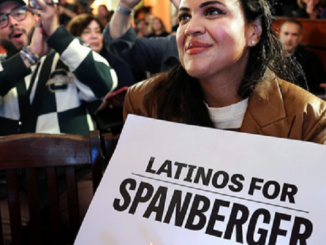by Roberto Suro

The recording of racist banter by Los Angeles Latino council members is a sad museum piece. These veterans of ancient battles for Latino empowerment failed to see how today’s Latinos, especially the young, are redefining identity politics in ways that will become evident in the midterm election results.
This older generation of leaders relied on raw population growth to attain power. Many advocates and analysts still peddle the “sleeping giant” view of Latinos as an ever-growing bloc. Others portray them as “swing voters,” up for grabs on a national scale. Both views understate the proliferation of Latino political aspirations.
Hispanic eligible voters jumped from 14.3 million in 2000 to 34.5 million this year. Geographic dispersal and economic segmentation accompanied that growth. The resulting differences go far beyond disparities based on national origins — Cubans vs. Mexicans, for example — and the like. The new Latino polity is thoroughly Made in the USA.
Local conditions and national trends influence Latino voters as much as anyone else. Though Democrats have drawn a clear majority for decades, recent elections give Republicans hope they can change that dynamic. And even bigger changes are coming.
In the early 2000s, the engine of Latino growth shifted from immigrant arrivals to native births. This new generation is now starting to run for office and to vote, with notable effects on both parties.
One of the pols on the L.A. recording insisted that Blacks should not hold “Latino seats.” After a 40-year career with notable accomplishments, Gil Cedillo, 68, lost his primary to a candidate less than half his age. Rather than touting her Hispanic identity, Eunisses Hernandez rallied a diverse coalition around an anti-establishment agenda that worked for progressive Democrats elsewhere.
Meanwhile, young, female Mexican Americans are similarly campaigning against the local political establishment in South Texas. All are challenging seats held for decades by Latino Democrats. Like Hernandez — but at the other end of the ideological spectrum — these Republicans offer generational change and polarized messaging to address dissatisfaction with local conditions.
In Los Angeles, Hernandez captured the angst in rapidly gentrifying city neighborhoods by condemning a Latino old guard she said was beholden to developers.
In the Rio Grande Valley, it’s the border. The GOP Latinas blame Latino Democrats for chaos and criminality in a place long remembered as a membrane between cousinly communities. But build-the-wall MAGA has exposed the limits of ethnic solidarity: With each new generation, family roots in Mexico become more distant so that newcomers are portrayed as unworthy asylum seekers from Central America and beyond, different from hard-working ancestors.
On abortion, meanwhile, a recent survey shows significant differences among Latinos by age, education and religious affiliation that now more or less mirror the general population. Foreign-born Spanish speakers are far more likely to say abortion should be illegal than native-born English speakers. Greater exposure to U.S. politics produces divisions similar to those in the general public.
A powerful schism by gender is developing among Latinos as it long ago did among Whites. A poll of registered voters in September found that Latino males favor Republicans by nearly 20 points (41 percent to 22 percent) on a generic ballot compared with Latino females. Similar margins by gender prevailed on President Biden’s disapproval rating, Donald Trump’s approval and Republican positions on immigration and the economy.
But generational change is the most powerful factor shaping Latino political identities, and that process has just begun. So far, Latino young adults, like others of that age group, are not engaged. In a recent poll of Latino registered voters,the twenty-somethings are half as likely to say they are interested in the election as their grandparents’ age group.
Republicans can find good news in that poll as Biden’s approval rating was 15 points lower among Latino young adults compared with their elders — roughly double the generation gap in the general public. Older, Cuban-born voters are stalwart Republicans. Their young, U.S.-born children are about evenly divided — like the rest of the country.
Now imagine the future: Nearly half of U.S.-born Latinos are under 18 years old, more than twice the percentage of U.S.-born Whites. These oncoming voters are digital natives and products of U.S. schools, yet many were raised with immigrant inheritances. About half pass effortlessly between Spanish and English. They are culturally heterogenous; already, nearly 4 in 10 native-born Hispanics are marrying non-Latinos.
The last 20 years shows that population growth spawns diverse interests rather than cohesion. The midterms are telling us that today’s Latinos do not define themselves by simple party loyalties or the old ways of identity politics.
Instead of guessing about their future politics, we need to ask how our politics today, so viral and divisive, is already influencing them.
.
Roberto Suro is a professor of journalism and public policy at the University of Southern California.




Be the first to comment